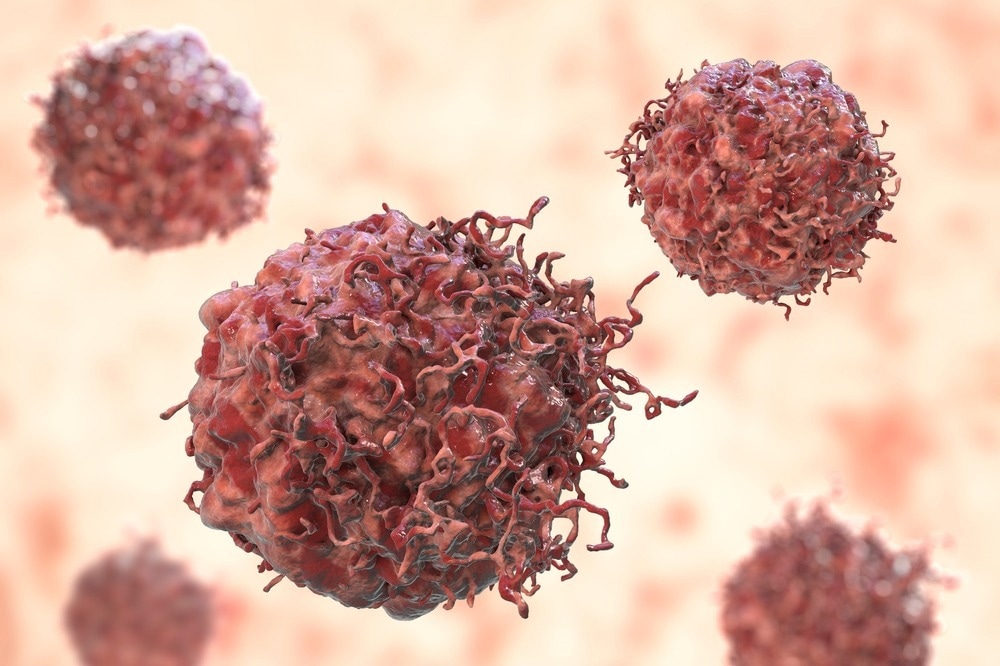In a recent study, a novel combination of treatments was discovered to effectively reduce the growth of pancreatic cancer in mice by inhibiting cancer cells from seeking fuel sources.
 Image Credit: Kateryna Kon/Shutterstock.com
Image Credit: Kateryna Kon/Shutterstock.com
The study carried out by scientists at NYU Grossman School of Medicine, the Department of Radiation Oncology, and the Perlmutter Cancer Center expands upon earlier findings at NYU Langone Health.
These previous studies uncovered the mechanism by which pancreatic cancer cells resort to alternative fuel sources to evade starvation and sustain their growth. As fast-growing pancreatic tumors reduce their blood supply, oxygen, blood sugar, and other essential resources typically delivered by the bloodstream become scarce.
Within this challenging environment, the capacity to switch fuels plays a significant role in the lethal nature of pancreatic cancers.
The research was published on October 9th, 2023, in the journal Nature Cancer. The study investigates a medication developed to hinder the ability of pancreatic ductal adenocarcinoma (PDAC) cells to execute one of these metabolic switches.
Specifically, PDAC cells employ the enzyme glutaminase to transform the amino acid glutamate into glutamine, which serves as a source of fuel to support their aggressive tumor growth. Unfortunately, drugs designed to inhibit glutaminase have been demonstrated to prompt cancer cells to adopt different scavenging pathways.
Hence, researchers in the field turned their attention to experimental therapies such as DRP-104, developed by Dracen Pharmaceuticals. DRP-104 represents a new “prodrug” iteration of the compound 6-Diazo-5-oxo-L-norleucine (DON), designed to address toxicity concerns observed with a previous version of DON.
DON's initial purpose was to starve cancer cells by mimicking glutamine, thereby broadly inhibiting all metabolic pathways reliant on glutamine, in contrast to glutaminase inhibitors. Currently undergoing clinical trials for non-small cell lung cancer, DRP-104 cannot be utilized as a fuel source but instead attaches to the same enzymes as glutamine.
In the ongoing research, the administration of DRP-104 alone resulted in a reduction in PDAC growth in mouse models of pancreatic cancer. Notably, the research team discovered that PDAC cells, compelled into a metabolic crisis by DRP-104, heightened their signaling through a protein named extracellular signal-regulated kinase (ERK) as a compensatory response to the diminished glutamine metabolism.
When the team combined DRP-104 with an established medication that inhibits the ERK signaling pathway, trametinib, it significantly enhanced the survival of pancreatic cancer mouse models compared to using DRP-104 treatment on its own.
Despite a decade of advances in understanding how cancer cells switch fuel sources, we have not yet effectively translated this into clinically relevant therapies. Broad antagonism of metabolic pathways with glutamine analogs may provide another mode of attack against these highly resistant tumor cells. The fact that such drugs are already being tested in the clinic makes us hopeful that we may finally see patient outcomes improve, if this approach proves to be effective in clinical trials.”
Alec Kimmelman, M.D., Ph.D., Study Corresponding Author and the Anita Steckler and Joseph Steckler Chair, Department of Radiation Oncology, NYU Grossman School of Medicine
In the future, the research team will aim to unravel the effects of glutamine antagonism on additional adaptive nutrient-scavenging mechanisms within pancreatic cancers and explore the feasibility of targeting these pathways. Dr. Kimmelman underscores that the effectiveness of such strategies will hinge on a delicate equilibrium between enhanced therapeutic efficacy and the potential for increased toxicity to normal tissues.
Source:
Journal reference:
Encarnación-Rosado, J., et al. (2023). Targeting pancreatic cancer metabolic dependencies through glutamine antagonism. Nature Cancer. doi.org/10.1038/s43018-023-00647-3.